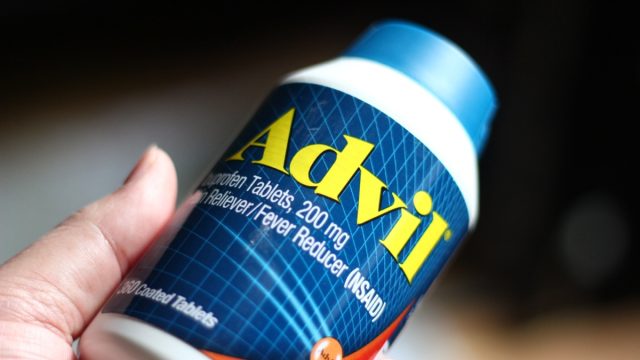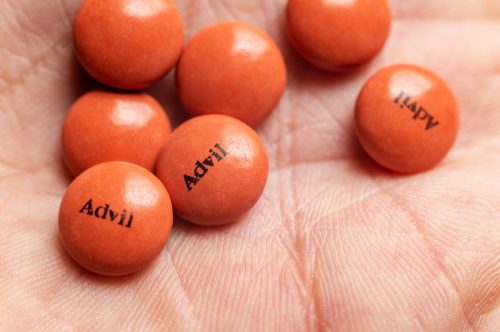Multiple Advil Products Sold at Family Dollar Recalled, FDA Warns

A pain reliever is a staple in your medicine cabinet—and something to always have on hand. If you prefer ibuprofen when you have a migraine or other aches and pains, you may reach for name-brand Advil when restocking your supply. But if you do rely on Advil, you’ll want to double-check the variety that you picked up, especially if you do your shopping at Family Dollar: The U.S. Food and Drug Administration (FDA) just issued a recall notice for multiple Advil products sold at the discount retailer. Read on to find out which varieties are being pulled from shelves, and what you should do if you have one at home.
READ THIS NEXT: Vitamins Sold Nationwide Recalled Due to Health Concerns, FDA Warns.
Seventy-three batches of Advil are subject to recall.

According to a May 4 announcement from the FDA, seven over-the-counter (OTC) Advil products sold at Family Dollar are subject to recall, including Advil 200-milligram tablets (100-count); Advil 200-milligram caplets (24-count); Advil Dual Action caplets (36-count); Advil tablets (50-count); Advil Liqui-Gel (40-count); Advil tablets (six-count); and Advil Liqui-Gel Minis (20-count).
All 73 batch numbers (also called lot numbers) are listed in the recall notice. According to GoodRx Health, you can find these numbers printed next to the barcode, the expiration date, or near the dosing instructions.
The medication was stored at the wrong temperature.

Family Dollar voluntarily recalled the Advil products, as they were stored “outside of labeled temperature requirements.” According to the National Library of Medicine (NLM), an institute within the National Institutes of Health (NIH), ibuprofen should be stored “at controlled room temperature,” between 68 and 77 degrees Fahrenheit. The NLM also notes ibuprofen shouldn’t be exposed to excessive heat (above 104 degrees Fahrenheit) or excessive humidity.
Recalled products were stored and shipped to certain Family Dollar stores “on or around” June 1, 2022, through March 31, 2023, the FDA notice states. The discount chain notified affected stores, which were instructed to “check their stock immediately and to quarantine and discontinue the sale of any affected product.”
RELATED: For more up-to-date information, sign up for our daily newsletter.
Call your doctor with any health concerns.

If you purchased a recalled Advil product, you can bring it back to the Family Dollar store where you bought it. You don’t need a receipt to return it, the FDA notes.
As of May 4, Family Dollar hadn’t received any complaints or reports of illness connected to the Advil recall, the FDA said. However, if you experience any problems you believe may be related to taking recalled Advil, contact your doctor or healthcare provider, per FDA guidance. The agency also asks that you report quality problems or adverse reactions to the FDA’s MedWatch Adverse Event Reporting program online, by mail, or by fax.
For specific questions about the recall, call Family Dollar Customer Service at 844-636-7687 between 9 a.m. and 5 p.m. Eastern Standard Time (EST).
This isn’t the first time Family Dollar has pulled products due to storage concerns.

In July 2022, Family Dollar was in a similar position, forced to recall 430 different OTC medications and toiletries stored outside of temperature requirements. The products were listed in an 11-page document, including a variety of name-brand toothpaste, deodorant, soap, sunscreen, and lip balm, as well as medications like lidocaine, pain relievers, and allergy meds. Tylenol and Dayquil were among the medications pulled from shelves at the time.
Just two months later, Family Dollar announced additional voluntary recalls after it was discovered that products weren’t stored at the proper temperature. The first recall notice from the FDA included six Colgate toothpaste and mouthwash products, while the second notice included even more products, with Family Dollar recalling 41 OTC “medical devices” such as pregnancy tests, contact lens solutions, denture cleaners, adhesive bandages, nasal sprays, and personal lubricants.
Best Life offers the most up-to-date information from top experts, new research, and health agencies, but our content is not meant to be a substitute for professional guidance. When it comes to the medication you’re taking or any other health questions you have, always consult your healthcare provider directly.
- Source: https://www.fda.gov/safety/recalls-market-withdrawals-safety-alerts/family-dollar-initiating-voluntary-recall-certain-over-counter-drug-products-because-products-have
- Source: https://www.ncbi.nlm.nih.gov/pmc/articles/PMC6931163/
- Source: https://www.fda.gov/safety/medwatch-fda-safety-information-and-adverse-event-reporting-program/reporting-serious-problems-fda
- Source: https://www.fda.gov/safety/recalls-market-withdrawals-safety-alerts/voluntary-recall-certain-over-counter-products
- Source: https://www.fda.gov/media/160146/download
- Source: https://www.fda.gov/safety/recalls-market-withdrawals-safety-alerts/voluntary-recall-certain-colgate-products-sold-family-dollar-stores-because-they-were-stored-outside
- Source: https://www.fda.gov/safety/recalls-market-withdrawals-safety-alerts/voluntary-recall-certain-over-counter-products-sold-family-dollar-stores-because-they-were-stored